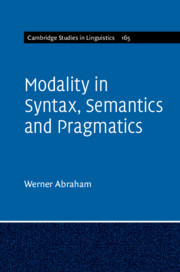Description
Modality in Syntax, Semantics and Pragmatics
Cambridge Studies in Linguistics Series
Author: Abraham Werner
An innovative survey that covers the linguistic questions of modality and mood, offering a new model for the phenomenon.
Language: English
Subject for Modality in Syntax, Semantics and Pragmatics:
Approximative price 31.58 €
In Print (Delivery period: 14 days).
Add to cart
Modality in Syntax, Semantics and Pragmatics
Publication date: 04-2023
454 p. · 15.2x22.9 cm · Paperback
Publication date: 04-2023
454 p. · 15.2x22.9 cm · Paperback
Approximative price 115.27 €
In Print (Delivery period: 14 days).
Add to cart
Modality in Syntax, Semantics and Pragmatics
Publication date: 09-2020
300 p. · 16x23.5 cm · Hardback
Publication date: 09-2020
300 p. · 16x23.5 cm · Hardback
Description
/li>Contents
/li>Biography
/li>
What do we mean when we say things like 'If only we knew what he was up to!' Clearly this is more than just a message, or a question to our addressee. We are expressing simultaneously that we don't know, and also that we wish to know. Several modes of encoding contribute to such modalities of expression: word order, subordinating subjunctions, sentences that are subordinated but nevertheless occur autonomously, and attitudinal discourse adverbs which, far beyond lexical adverbials of modality, allow the speaker and the listener to presuppose full agreement, partial agreement under presupposed conditions, or negotiation of common ground. This state of the art survey proposes a new model of modality, drawing on data from a variety of Germanic and Slavic languages to find out what is cross-linguistically universal about modality, and to argue that it is a constitutive part of human cognition.
Part I. Modes of Modality: Introduction; 1. Pragmatics: modality and speaker orientation; 2. (Inter) subjectification and foreign consciousness alignment; 3. Modality as distance – from aspect to modality; Part II. Verbal Modality: 4. The syntax-semantic-pragmatic interface of modal verbs; 5. The perspectival specifics of verb modality in German; 6. The syntax of modal verbs in German, Dutch, and English; 7. Modal verb semantics; Part III. Adverbial Modality Distance: From Apect to Mpp: 8. Modal particles: the enigmatic category; 9. The attitudinal force of modal particles; 10. Modal particles between context, conversation, and convention; 11. Modal particles outside of finiteness; Part IV. Covert Modality: 12. Covert patterns of modality.
Werner Abraham is Professor Emeritus in Linguistics and Mediaeval Studies at the Rijksuniversiteit Groningen, The Netherlands, Honorary Professor at the Universität Wien, and is still active at the Ludwig Maximilan University of Munich, Germany. He is author of more than 350 articles, 5 monographs, and 35 book collections.
© 2024 LAVOISIER S.A.S.
These books may interest you

Modality Across Syntactic Categories 133.90 €

Deontic Modality 120.27 €


